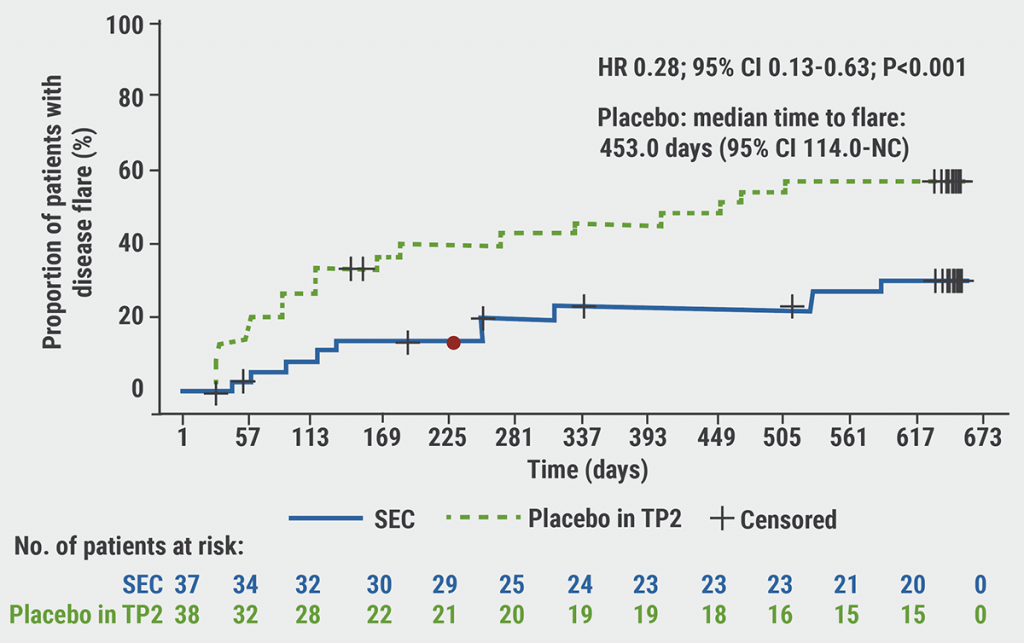https://doi.org/10.55788/0ab2d244
Autoimmune and inflammatory diseases are characterised by an imbalance between immune activation and control. “Disease, for the most part, is just dysregulated health,” said Prof. Goodyear [1]. “It’s not that the immune system is doing something that it wasn’t meant to do, it does everything it was programmed to do, just at the wrong time and place, probably with the wrong drivers.” The problem with immunological diseases is that they are chronic and self-perpetuating, even if the original trigger is gone.
Prominent pathogenic mechanisms are present across tissues in psoriatic disease [2]. “We have the inflamed skin, the synovium, and the entheseal site, and you will see very similar cytokines and very similar cells, although there are subtle differences. And it’s those differences we need to understand” [1]. However, the commonality of pathways leads to common therapeutic options including agents targeting TNF, IL-23/IL-12, IL-17A IL-17A, and PDE4 inhibitors. Yet, it should be noted that therapeutic responses tend to diminish over time, regardless of their target, leading to psoriatic disease being harder to treat with subsequent therapies [3].
This poses the question of whether “we actually help the disease evolve when we give people the wrong drugs,” said Prof. Goodyear [1]. “Drugs are all active and will change the immune system, which will adapt and respond. There are no data to confirm this, but we need to understand what we are doing to people, which is why personalised medicine is important.”
Biomarker signatures have been used to predict methotrexate response in patients with rheumatoid arthritis. Using data from the SERA registry in Scotland, Prof. Goodyear’s group identified a 5-marker chromosome conformation signature that can predict early response to methotrexate with a positive predictive value of 89% and a negative predictive value of 87% [4]. But can this be expanded to psoriatic arthritis? Prof. Goodyear reported unpublished data identifying 30 potential markers for methotrexate response in psoriatic arthritis. However, the model needs refining to an 8–12 model marker and further validation. “Additionally, we are also looking at adalimumab where we’ve gone down to a 12-marker model, where we can classify people who do or do not have a response. Now we need another cohort to do a blinded validation to see if this test can work in the clinic.” Other similar analyses are ongoing for response to tofacitinib and anti-IL-17 medications.
Finally, Prof. Goodyear discussed the possibility of finding new targets through genomic, epigenomic, environmental, microbiome, and tissue function analyses. “We have these responders and non-responders and we have to use this differential to find new mechanistic understanding that could be in circulation or tissue,” said Prof. Goodyear. “There’s lots of hope there and we are moving in the right direction.”
- Goodyear C. Advances in genetics and immunology of psoriatic arthritis. IFPA Conference 2024, 27–29 June, Stockholm, Sweden.
- Najm A, et al. Nat Rev Rheumatol. 2023;19(3):153-165.
- Smolen JF, Daniel Aletaha D. Nat Rev Rheumatol. 2015;11(5):276-89.
- Carini C, et al. J Transl Med. 2018;16(1):18.
Copyright ©2024 Medicom Medical Publishers
Posted on
Previous Article
« Depression complicates the management of psoriatic disease Next Article
Genetic and immunological advances in risk assessment and treatment of psoriatic diseases »
« Depression complicates the management of psoriatic disease Next Article
Genetic and immunological advances in risk assessment and treatment of psoriatic diseases »
Table of Contents: IFPA 2024
Featured articles
Multiple novel oral agents show promise in psoriasis
Advances in psoriasis treatment: topical therapies show promising results
Personalised Medicine and Genetics in Psoriatic Disease
How close are we to personalised medicine in psoriatic arthritis?
Genetic and immunological advances in risk assessment and treatment of psoriatic diseases
Using advances in the genetics of psoriatic disease to better predict treatment response
Comorbidities and Complications in Psoriatic Disease
Depression complicates the management of psoriatic disease
The unfavourable role of obesity in psoriatic disease
Managing obesity and fibromyalgia in psoriatic disease
Advances in Psoriasis Treatment
Multiple novel oral agents show promise in psoriasis
Biologics for psoriasis: towards oral therapies and less frequent dosing
Advances in psoriasis treatment: topical therapies show promising results
Special Populations and Psoriatic Disease
Improving outcomes in pregnancy and psoriatic disease
Towards prevention of psoriatic arthritis in patients with psoriasis
Diagnostic Challenges and Disease Management
Itch and pain are major components of psoriatic disease and require management
Can diet help with the management of psoriasis?
Biologics in psoriatic arthritis: where we are and where we are headed
Related Articles
July 31, 2023
Vascular inflammation may be characteristic of PsA

© 2024 Medicom Medical Publishers. All rights reserved. Terms and Conditions | Privacy Policy
HEAD OFFICE
Laarderhoogtweg 25
1101 EB Amsterdam
The Netherlands
T: +31 85 4012 560
E: publishers@medicom-publishers.com

